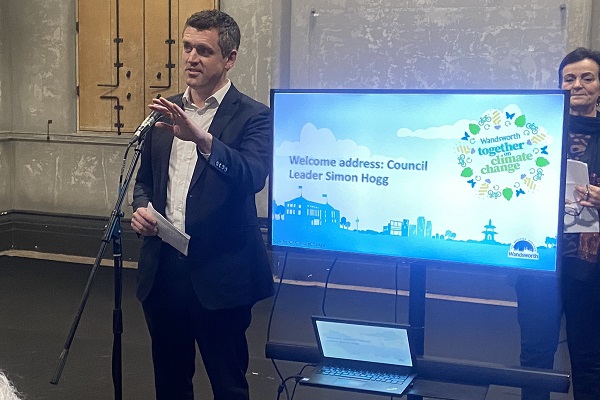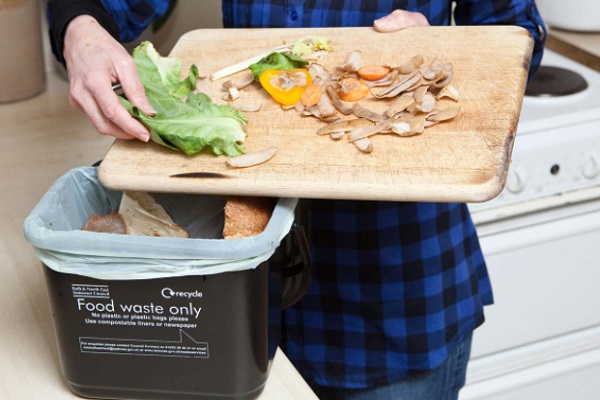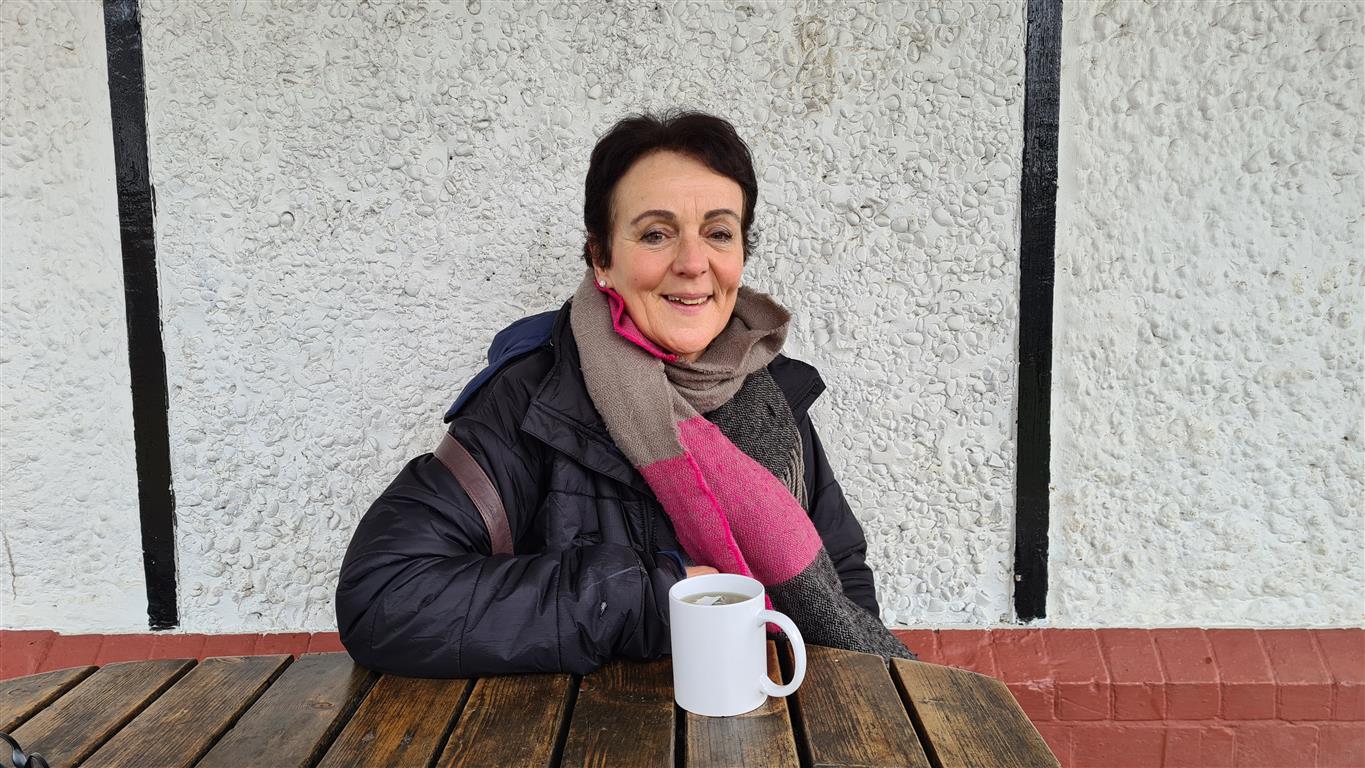Judi Gasser asked to meet in Tooting Common as she could bring her young but energetic tall grey mix Spaniel and Lurcher (which she referred to as a ‘Splurcher’!). It took several weeks to organise the meeting as she is incredibly busy ; just enough time for a brief chat while she is also having her lunch, as she had to rush to another council meeting about waste management after we finished.
Councillor Judi Gasser is Wandsworth’s cabinet member for the environment in the new Labour Council elected in May 2022. This means that she oversees hundreds of officers and civil servants and is responsible for recycling, waste collection, street cleaning, the management and maintenance of the borough’s parks and commons, as well as ensuring that Wandsworth does everything it can as a borough to tackle the climate change emergency.
Judi did not begin her career as a green activist, but she joined the Labour Party well over 30 years ago after returning from South Africa, where she had been travelling. Later, she moved to the south of the River from Bedford and ran the Bread and Roses, in Clapham. She describes the pub, funded by the Battersea and Wandsworth Trades Union Council, as “home for the Unions, by the Unions, for the Left“. During her time the pub, won many awards, including pub of the year.
She eventually moved to Tooting about 20 years ago and became involved in local politics. She was elected as a councillor in 2006. “There were only 9 Labour and 51 Tories, and it was very hard,” she recalls.
However, after 2010 she decided to take a break to dedicate more time to her young children. Eight years later, she returned and was re-elected in 2018. She became the Opposition Speaker in the Education and Children’s Services Overview and Scrutiny Committee, as well as in the Education and Standards Group.
At the same time she was also working for the Zoological Society of London (ZSL), an international conservation charity driven by science that works to restore wildlife by protecting critical species and ecosystems. She mainly worked in fundraising for projects in the UK and around the world where she became much more aware of the environment and climate change.
In the 2022 local election she kept her seat in Furzedown ward for a second term and she was chosen to take the lead on environment in the new Cabinet after Labour took control of the Council. Her role now is to articulate the four pledges displayed in the Wandsworth Labour manifesto: being carbon neutral, treasuring green spaces, tackling litter, and reducing air pollution.
With the Sustainability partnership. the Strategy Room project, the Environment forum and the Citizens Assembly, her idea is to listen and engage with people
Labour has pledged to become a net-zero Council by 2030 and set a target to be a net-zero borough by 2043. However, reducing and then stopping carbon emissions from the Council is already a difficult task.
The perimeter for the Council needs to be defined first as the office buildings but also leisure centres, children’s centres and schools. However, it excludes the Council estates at the moment. “The Town Hall itself is a major headache as this is ancient, and a listed building,” she said. It involves refurbishing many of the facilities. Some of the facilities need a complete refit, insulation, changing gas boilers for sustainable energy, and more. All the necessary work requires a lot of money and every time that there is some government funding available, they apply for it. Bids include £3.5m from the Public Sector Decarbonisation Scheme to make improvements to council buildings, funds from the Social Housing Decarbonisation Fund for measures such as insulation, double glazing, etc.
The 2043 target is more an aspiration for the future, as housing, primarily Council housing, needs a lot of change. That’s why Judi Gasser has set up the Wandsworth Sustainability Partnership. This body is composed of large stakeholders such as the heads of the Wandsworth Chamber of Commerce, Roehampton University and South Thames College, St Georges Hospital, Southside, and members of the Wandsworth Environmental Forum, along with the Council leader Simon Hogg and other key councillors and officers. Officers contacted groups they had details for, but according to Judi, anybody interesting is welcome to join. The partnership should be a set to exchange ideas, she explained.
The Partnership was launched last December at the Battersea Arts Centre and should meet quarterly.

The Strategy Room project, funded by the government, is another initiative run by a campaigning group. The project involves running workshops across the country, including a few in Wandsworth, to consult people and group representatives on their ideas for addressing environmental and climate change.
The Citizen Assembly is Judi’s pet project, which focuses on air quality. “There was a big problem with low traffic neighbourhood with the previous administration, because it was imposed from above. My idea was to listen to people: we have to make those very difficult decisions together“.
In order to have not only environmentalists but a good representation of residents, Shared Future, an independent company used to organise those assemblies, generated 10,000 random addresses, invited people to join and a few hundred wrote back. They selected a sample of 50 people from the responses representing the diversity of the borough.
An oversight panel made with environmental groups, officers, representatives of Shared Future, Labour Councillors and opposition councillors is helping with the planning and can be consulted by the Assembly. Judi Gasser stated that the decision not to include representatives from the Green party and the Libdems was made by the officers.
The recommendations put forth by the Citizen Assembly will be included in the new air quality action plan and officers will be responsible for their implementation. However, Judi said that the feasibility and cost of the proposals will determine their implementation. She added that they will implement “as much as they possibly can” and that the climate fund currently has £1.3 million remaining (out of £5 million); the Leader of the Council has indicated that he is willing to provide additional funding.
Last November, Wandsworth became the first-inner London borough to receive a top grade for its climate action from environmental impact non-profit CDP. This rating is based on a variety of factors, including being transparent about the climate change response, completing climate risk and vulnerability assessments, publishing a climate action plan, and setting science-based climate targets.
About Tree protection in general and Clapham Common in particularly
Tree planting is another topic where she confirmed that residents do not have an easy way of requesting more trees or a replacement in their street. The management of parks and green spaces has been devolved by the previous Tory administration to leisure and culture contractor Enable, and it was palpable during our conversation that the relationship with contractors was not yet optimum.
Tree officers have been asked to produce a new framework (besides the existing Tree Policy), and Judi Gasser wants the different organisations of residents (Friends of Totting Common, Friends of Wandsworth Common, etc.) to be involved and provide input.
The council and specifically their contractor Enable look after around 62,000 trees in parks, commons and open spaces with around 15,000 planted in streets and on housing estates.
She commented that trees were not a big concern for the previous administration and that protected trees (TPO) were removed in Wandsworth roundabout to make space for property developers, and that an old and big Black Poplar tree, the nation’s rarest native tree, was chopped down last year in York Gardens as it prevented easy work to lay cables and structure for future constructions.
She clearly said that she hopes her colleagues in the Planning Committee will refuse any permission that takes out TPO trees and intend to have a discussion with them on this subject. However she also stated:
“Very occasionally the public benefit- such as building desperately needed social housing in York Gardens- is paramount.”
We also mentioned Clapham Common and she explained about the way the park is managed.
Clapham Common is owned and managed by Lambeth (even though half is within Wandsworth boundary) and has been since 1971, the Land Registry titles for the Common, for both Lambeth and Wandsworth sides confirm that it is vested in Lambeth. Judi said:
“I understand where planning permission is required for events on the Clapham Common, WBC Planning, are consulted as the neighbouring authority. Lambeth can of course ignore our comments, which has happened in the past.”
There is no formal body/board between the two boroughs but officers do talk informally all the time to deal with issues or share information; officers are looking into your suggestion of a more formalised collaboration/consultation.
You also mentioned that Festival Republic are applying for planning permission for their programme of events over the summer. Wandsworth officers are waiting to receive the consultation document.
A pledge made on a political leaflet can be much more difficult to implement once in power, as Labour councillors find now
Food waste collection, which was on their manifesto, has been challenging to organise. They have managed to run a trial in Southfields, which was collected weekly as part of the borough’s normal refuse and recycling collection service. They are slowly looking at rolling it out to Bedford Hill, the Balham Hill Estate and Andrew Reed House in West Hill.
Homes participating in the scheme are given kitchen food caddies and biodegradable caddy liners to store their food waste, plus larger external food containers, which are collected weekly as part of the borough’s normal refuse and recycling collection service.

Food waste collected separately is sent to an anaerobic digestion plant where micro-organisms break it down to produce biogas that’s fed into the National Grid, as well as liquid fertiliser used to improve agricultural soils.
However, they are currently restricted by the contract negotiated previously with contractors in charge of the refuse collection. Clapham Junction is currently out of the list, so we shouldn’t see any food waste collection from the Council anytime soon.
Their commitment for more bins in streets is also under review as officers are telling them that it often leads to more litter, Judi Gasser explained. “When you are in opposition, you don’t get all the information“, she said. They are now looking at alternative possibilities such as more frequent collections.
One of the first changes they made when coming to the council was to set recurrent Mega Skip Days every month. The idea is to prevent flytipping by offering the possibility to take up to six items along to the nearest mega skip for free (there are usually about eight locations in the borough). The council can charge from £20.60 to remove bulky items from households. However, the rule is currently limiting the offer to six items, and there have been criticisms that six batteries cannot be similar to six sofas.
One of the first changes they made upon joining the Council was to introduce recurrent Mega Skip Days every month. The initiative was started by the Conservative Council in past years, but it was infrequent. The idea behind it is to prevent fly-tipping by allowing residents to take up to six items to the nearest mega skip for free (there are usually about eight locations in the borough). Without this scheme, the Council can charge from £20.60 to remove bulky items from households.
However, the rule is currently limiting the offer to 6 items and criticisms have been raised that 6 batteries or 6 cushions cannot be similar to 6 sofas. Judi stated that Council officers told her there has been no confusion from residents using the mega skips about the 6 item rule. She said:
“All , without exception have been extremely complimentary about the skips. If a resident were to try and dispose of 6 sofas that would certainly ring alarm bells and further questions would be asked.”
Many other things are still only in the planning stage, such as a plastic-free campaign that they will be working on. On addition, she also said that she is very regularly in contact with Clare Fraser, cabinet member for Transport and they meet/talk several times a week.
Despite having a lot on her plate, she approaches each task with energy as she knows it’s only the start of a long journey. Her determination was evident in her strong address during the Council meeting held on Wednesday, March 8th.













